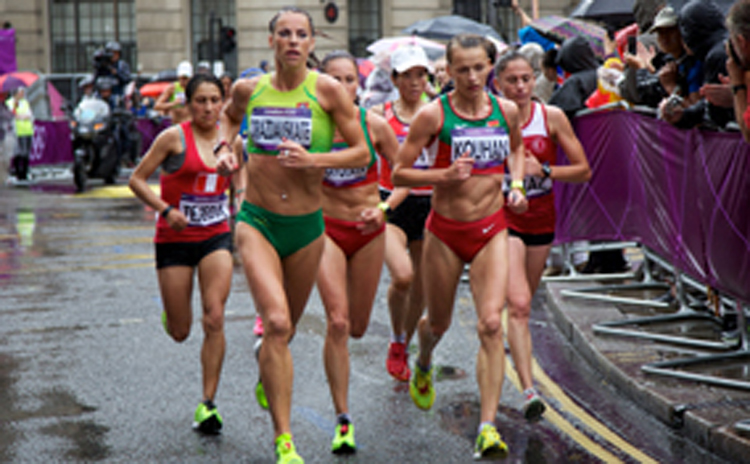
Training for a race takes a lot of time, but all your efforts can disappear in the days leading up to the event if you don’t maintain your commitment level. You must prepare yourself for races and even a casual 5K both mentally and physically. Invite your friends and family to come cheer you on at the race, as you’ll need a good support team to give you something to look forward to at the end of the race — aside from your own personal satisfaction, of course.
The Days Before
In the days leading up to the event, try not to taper off your physical activity too much. You don’t have to go out and run the whole race before race day, but keep up a consistent level of activity. Try a new exercise or running the race in two increments with a break in between. Pick up your race kit early if you can; some events allow you to do it a couple of days before. That way, you have one less thing to worry about come race day.
Sleep is also very important throughout your training, especially in the days leading up to the main event. Make an extra effort to get at least eight hours of sleep each night. In the time that you’re not doing those longer runs, take a nap. You’ll be thankful you did later.
The day before the race, try to take the day off from any hardcore exercising. That doesn’t mean don’t exercise at all, though. Go for a walk or a ten to fifteen minute jog and stretch out your muscles.
Eat carbs. Carb-loading is very important before a race, big or small. Simple carbs allow your body to retain water, keeping you hydrated throughout the day and the race. Speaking of hydration, try to drink 4-8 glasses of water a day during your training, especially in the days leading up to the race. Do not drink alcohol, as it will only dehydrate you. If you can, find out what kind of drinks the race will be giving out and train with them, because if you train with the same drink, it will decrease your chances of stomach problems during the race.
At the end of the day, put what you need for the race aside for tomorrow. Then, before you go to bed, mentally prepare yourself by visualizing the race and the path. Remember, you can do this!
The Day of the Race
It’s race day! How should you prepare? Start by waking up early and eating a carb-rich breakfast, staying away from foods high in fat or fiber. Aim to consume 75-100 grams of carbs about three hours before your race starts, or at least 50 grams two hours out. It is also important to drink about 16 ounces of water two hours before race time. This will allow enough time for the water to pass through your system and the excess to be voided well before the start.
Don’t overdress for the race. It may be freezing in the morning, but the weather will warm up and you will begin to sweat. A good rule of thumb is to dress as if the weather is 15 degrees warmer than it is. If it’s cold, you can always wear warmer clothes while you’re waiting for the race to start.
You should arrive at the race about a half an hour before the race begins, giving to ample time to warm up. Begin with some light jogging and dynamic stretches. Finish your warm up with a few 20 to 30 second bursts at the actual pace you will be running. Good luck!
During the Race
Quick tip: Use the hydration stations, that is what they’re there for. However, if you didn’t use the drink they are passing out during your training, don’t drink it, because it could upset your stomach during the race. This is why it is important to try and find out what they will be using ahead of time.
Keep your movements fluid and remember to encourage yourself mentally. Have a mantra that you keep tell yourself throughout the race:
- Can’t stop. Won’t stop.
- Not everybody can do this!
- One step at a time.
- Be fierce. Be bold.
- Make mom proud!
Remember, this is what you’ve trained for. You can do it!
Recovering
Recovering from a race is just as important as training and preparing for a race. Recovery happens in three main phases:
Phase 1: Right after you finish
- Don’t stop moving. Continue with a light jog or brisk walk to allow your legs to cool down.
- Hydration is just as important now as it was before and during the race. Try to drink something with electrolytes, like a sports drink, to give you an energy boost.
- Don’t forget to stretch when you’re done. This will help you avoid injury and will make it much easier for you to get out of bed tomorrow morning.
Phase 2: Within an hour of finishing
- Eat something. Most races provide after-race snack such as bananas, bagels, avocados and sports bars. Dig in.
- Ice yourself. Hopefully you were able to avoid injury, but just in case you start to feel any pain, find some ice.
Phase 3: One to two days after the race
- You’ll probably wake up sore the next morning, so try some water, fruits and vegetables to help you get your energy back. Focus on rehydrating your body.
- Book a massage. It will help you loosen your tight muscles and relax.
- Go for a run. Try a short jog or run around the block to loosen up your muscles.
If you have back pain, try using ActivAided. It will help train correct postural habits while you exercise and after, when your muscles are fatigued and vulnerable.
